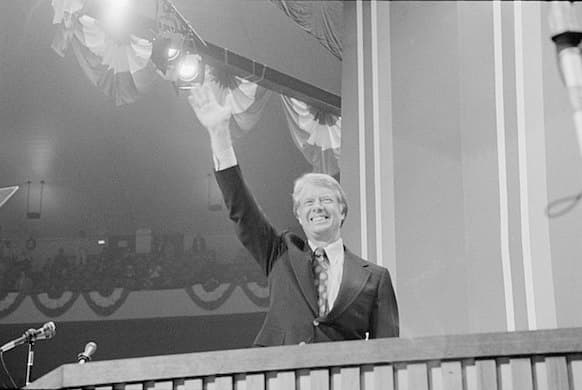Fatwa Against Rushdie Drew Sympathy of a President, a Prince, and Professors
There were mandarins who saw the ayatollah’s side of the argument.

As Sir Salman Rushdie battles back from a stabbing attack that sliced his liver and wounded his eye, support has arrived from the doyens of literature and politics, hailing the writer and wishing him well.
It was not always thus. When the fatwa was first leveled against Mr. Rushdie, in 1989, calling “on all valiant Muslims wherever they may be in the world to kill” Mr. Rushdie and his collaborators “without delay,” there were mandarins who saw the ayatollah’s side of the argument.
Three weeks after the fatawa was broadcast on Iranian radio, President Carter took to the pages of the New York Times with an op-ed titled “Rushdie’s Book is An Insult,” referring to “The Satanic Verses.” Mr. Carter begins by explaining that he “tried to learn as much as possible about the Muslem faith” in anticipation of brokering peace between Israel and Egypt and negotiating with Iran over hostages.
Regarding the mullahs who came to power in 1979, Mr. Carter observed that “their seemingly radical statements and actions are obviously sincere.” He notes that as “a well-versed analyst of Muslem beliefs,” Mr. Rushdie “must have anticipated a horrified reaction throughout the Islamic world” to his book.
Mr. Carter noted: “It is our duty to condemn the threat of murder, to protect the author’s life and to honor Western rights of publication and distribution.” He added, “At the same time, we should be sensitive to the concern and anger that prevails even among the more moderate Muslems.”
The president worried that “Ayatollah Khomeini’s offer of paradise to Rushdie’s assassin has caused writers and public officials in Western nations to become almost exclusively preoccupied with the author’s rights.”
Mr. Carter acknowledged that while “Rushdie’s First Amendment freedoms are important,” the West has “tended to promote him and his book with little acknowledgment that it is a direct insult to those millions of Muslems whose sacred beliefs have been violated.” He noted: “To sever diplomatic relations with Iran over this altercation is an overreaction.”
Turning his attention fully to realpolitik, Mr. Carter advised “tactful public statements and private discussions” as measures that “could still defuse this explosive situation” for the “millions” of Muslims “waiting for a thoughtful and constructive response to their concerns.” America must avoid supplying an “endorsement of an insult to the sacred beliefs of our Muslem friends.”
A prince as well as a president found reason to see Mr. Rushdie as an instigator. The novelist Martin Amis told Vanity Fair that at a “small dinner party” Charles, Prince of Wales, told him that His Royal Highness said in respect of Mr. Rushdie that he would not support anyone who “insults someone else’s deepest convictions.” Mr. Amis retorted that a novel “is an essentially playful undertaking.”
That sense of play was not shared by a one-time ambassador of the Islamic Republic of Iran to the United Nations and current professor at Oberlin College, Mohammad Jafar Mahallati. According to Reuters, in 1989 the Nancy Schrom Dye Chair of Middle East and North African Studies opined, “I think all Islamic countries agree with Iran.”
Mr. Mahallati added that “any blasphemous statement against sacred figures should be condemned.” In 2017, Amnesty International fingered him as a prominent whitewasher of the killing of thousands of political prisoners in Iran in 1988. The country denies that this culling transpired, though Amnesty puts the death toll in the thousands.

